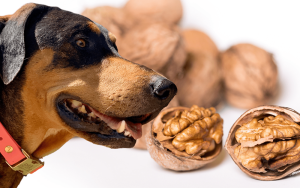Can Dogs Eat Watermelon? A Complete Guide to Watermelon for Dogs

Watermelon is a delicious, hydrating fruit that many humans enjoy during the warmer months. It’s sweet, juicy, and refreshing—making it a perfect summer snack. But when it comes to our furry companions, the question arises: Can dogs eat watermelon? As pet owners, it’s natural to want to share tasty treats with our dogs, but we must be cautious to ensure that certain foods are safe for them.
In this comprehensive guide, we’ll explore everything you need to know about feeding watermelon to your dog, including its benefits, potential risks, and how to serve it safely. Whether you’re curious about giving your dog a bite of watermelon for the
first time or looking to expand your dog’s diet with healthy, hydrating snacks, this article has got you covered.
Can Dogs Eat Watermelon? The Short Answer
Yes, dogs can eat watermelon in moderation. Watermelon is not toxic to dogs and can be a healthy treat when prepared properly. It’s packed with vitamins, minerals, and hydration, which can benefit your dog in small amounts. However, as with any treat,
it should only be given in moderation, and certain parts of the fruit should be avoided to ensure your dog’s safety.
Health Benefits of Watermelon for Dogs
Watermelon is more than just a tasty treat; it’s also full of health benefits for your dog. Here are some of the key nutrients and advantages that watermelon offers:
1. Hydration
Watermelon is made up of about 90% water, making it an excellent option for helping keep your dog hydrated, especially on hot summer days. Dehydration can lead to various health issues in dogs, so offering watermelon as an occasional snack can help replenish
lost fluids.
2. Low in Calories
Watermelon is a low-calorie fruit, making it a great option for dogs that need to watch their weight. A few small pieces of watermelon won’t contribute significantly to your dog’s daily caloric intake, making it a guilt-free treat.
3. Rich in Nutrients
Watermelon contains essential vitamins and minerals such as:
- Vitamin A: Important for maintaining healthy vision and immune function.
- Vitamin C: An antioxidant that helps reduce inflammation and supports the immune system.
- Potassium: Helps regulate fluid balance and supports muscle and nerve function.
- Magnesium: Important for bone health, muscle function, and enzyme activity.
4. Fiber Content
Watermelon also contains fiber, which can aid in digestion and help regulate bowel movements. A small amount of watermelon can assist in promoting healthy digestion for your dog.
5. Antioxidants
Watermelon contains lycopene, a powerful antioxidant that may support overall health by fighting free radicals in the body. Lycopene has been shown to have various health benefits for both humans and animals, including promoting cardiovascular health.
Potential Risks of Watermelon for Dogs
While watermelon is generally safe for dogs, there are some important precautions to consider before feeding it to your pet.
1. Seed Hazards
Watermelon seeds, especially the large black seeds, can pose a choking hazard or lead to digestive issues if ingested in large quantities. In some cases, watermelon seeds could cause a blockage in your dog’s intestines. Always remove the seeds before
offering watermelon to your dog.
2. Rind Danger
The rind of the watermelon, the tough, green outer layer, is not digestible for dogs and can cause gastrointestinal issues. Eating the rind can lead to stomach upset, vomiting, and diarrhea. It is best to avoid giving your dog the rind altogether.
3. Overconsumption
Although watermelon is low in calories, giving your dog too much at once can cause gastrointestinal distress, including bloating, diarrhea, or stomach cramps. Moderation is key when offering watermelon or any other fruit as a treat.
4. Sugar Content
Watermelon contains natural sugars, which, when consumed in large amounts, could contribute to weight gain, obesity, or dental issues in dogs. If your dog has diabetes or is overweight, it’s best to consult with your veterinarian before offering watermelon.
How to Safely Serve Watermelon to Your Dog
If you’ve decided to treat your dog to some watermelon, it’s important to prepare it in a way that’s both safe and enjoyable for your pet. Here are the steps you should follow to make watermelon a safe snack for your dog:
1. Remove the Seeds
Before serving watermelon to your dog, carefully remove all seeds from the fruit. You can either use your fingers or a melon baller to scoop out the flesh. It’s essential to eliminate both black seeds and smaller white seeds.
2. Peel the Rind
Cut off the tough, green rind of the watermelon. The rind can be hard for dogs to digest and may cause discomfort. Only offer the red, fleshy part of the watermelon, and discard any rind or unripe sections.
3. Cut into Small Pieces
Cut the watermelon flesh into small, bite-sized cubes. This will help prevent choking and make it easier for your dog to eat. Depending on the size of your dog, you may want to cut the pieces even smaller.
4. Serve in Moderation
Start by offering just a small amount of watermelon, especially if it’s your dog’s first time trying the fruit. Keep an eye on your dog afterward to ensure they don’t experience any adverse reactions. As with any new food, introduce watermelon gradually
and in small portions to monitor how your dog reacts.
5. Use Frozen Watermelon for a Cool Treat
Watermelon can also be frozen to create a cool and refreshing treat. Simply slice the watermelon into small chunks, freeze them for a few hours, and offer them to your dog as a fun, cool snack on hot days. It’s a great way to keep your dog entertained
and hydrated during summer months.
Can All Dogs Eat Watermelon?
Most dogs can safely eat watermelon in moderation, but there are exceptions. Certain dogs, particularly those with specific health issues or dietary restrictions, may need to avoid watermelon. Here are a few considerations:
1. Dogs with Diabetes
If your dog has diabetes, you should consult with your veterinarian before offering watermelon. While the fruit contains natural sugars, it may affect your dog’s blood sugar levels. A vet will be able to advise you on whether watermelon can be part of
your dog’s diet and how much is safe.
2. Dogs with Sensitive Stomachs
Some dogs may have sensitive stomachs and could experience digestive upset when introduced to new foods. If your dog has a history of gastrointestinal problems, it’s important to introduce watermelon slowly and in small amounts.
3. Small Dogs
For smaller dog breeds, watermelon should be given in even smaller portions to prevent choking hazards. Always be cautious when feeding watermelon to small dogs, as they may not be able to handle larger pieces.
How Much Watermelon Can You Give Your Dog?
As a general rule, treats should make up no more than 10% of your dog’s daily calorie intake. Watermelon is a healthy, low-calorie snack, but it’s important to not overdo it. The amount of watermelon you can give your dog will depend on their size and
weight. Here are some guidelines:
- Small Dogs: 1-2 small bite-sized cubes (about 1-2 ounces) of watermelon.
- Medium Dogs: 3-4 small cubes (about 3-4 ounces) of watermelon.
- Large Dogs: 5-6 cubes (about 5-6 ounces) of watermelon.
Always adjust portions based on your dog’s size and activity level. If in doubt, consult with your veterinarian to determine the appropriate portion size for your dog.
Other Fruits Safe for Dogs
If your dog loves watermelon, they may enjoy other fruits that are also safe and healthy. Some fruits that dogs can enjoy in moderation include:
- Apples (without seeds)
- Strawberries
- Blueberries
- Bananas
- Peaches (without the pit)
- Pineapple (without the core)
- Pears (without seeds)
Just like with watermelon, be sure to remove any seeds, pits, or rinds before offering these fruits to your dog.
Conclusion
In conclusion, watermelon can be a safe and healthy treat for most dogs when prepared properly. Its hydrating properties, low calorie count, and rich nutrient profile make it an excellent snack, especially during hot weather. Just remember to serve it
in moderation, remove seeds and rind, and watch for any signs of digestive upset.
As with any new food, it’s always a good idea to consult your veterinarian before introducing watermelon into your dog’s diet, especially if your dog has pre-existing health conditions. When given correctly, watermelon can be a refreshing and beneficial
treat that both you and your dog can enjoy together.
Final Tip: Always monitor your dog when offering new foods, and be sure to adjust the portions based on your dog’s size and needs. Happy snacking!






